Iranian Lawmaker Claims Iranians' Pockets Are 'Ripped'

A member of the Iranian Parliament has warned that Iranians' financial reserves have reached breaking point, stating that the government can no longer continue to drain resources from them.

A member of the Iranian Parliament has warned that Iranians' financial reserves have reached breaking point, stating that the government can no longer continue to drain resources from them.
Referring to the devastating currency fluctuations, Lotfollah Siahkali said, "People's pockets are ripped. If we were using the people's money until now, that is no longer possible".
Amidst ongoing economic challenges including food prices soaring, fuel becoming prohibitively expensive and record unemployment, Siahkali predicted that the latter half of the current Iranian year will prove even more difficult. His comments come in response to significant shifts in the currency market at the start of the year (Mid March), which have fueled inflationary expectations.
Siahkali pointed to the lack of stability in Iran's economic markets as a catalyst for the populace's shift towards more stable economic assets and currency such as the US dollar, gold, and real estate to preserve purchasing power against the rapidly depreciating rial.
The rial has suffered dramatically since the US withdrawal from the nuclear deal in 2018 and the subsequent reimposition of sanctions affecting key sectors such as oil exports and banking.
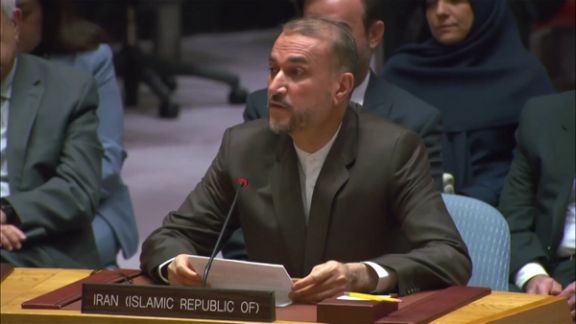
Iranian news outlets have been actively praising the recent visit of Foreign Minister Hossein Amir-Abdollahian to the United Nations headquarters in New York as a successful diplomatic effort.
The semi-official ISNA news agency detailed his engagements at the United Nations, highlighting his anti-Israel stances, interviews with American media, and comments on the recent attack on an airbase in Iran's Esfahan province.
ISNA reported an expert's view that "the foreign minister was able to use the opportunity… to explain the reasons for Iran's response to the Zionist regime, and to some extent dispel the incorrect narratives."
The report picked up by other news outlets in Tehran, also claimed that during Iran's April 14 missile and drone attack against Israel, supported by key Security Council members such as the UK, the US, and France, Israel portrayed itself as a “victim” while blocking any condemnation of its earlier attack on the Iranian consulate in Syria.
ISNA also praised the foreign minister's interview with CNN on Thursday in which Amir-Abdollahian said Iran's response to Israel “stayed within a minimum of frameworks,” noting that Tehran could have taken harsher measures.
In a discussion with NBC News on Saturday, the Iranian foreign minister addressed a recent unclaimed attack in central Iran, stating that the investigation was ongoing and that no direct links to Israel had been established yet. He described the drones involved in the incident as trivial, likening them to "toys that our children play with."
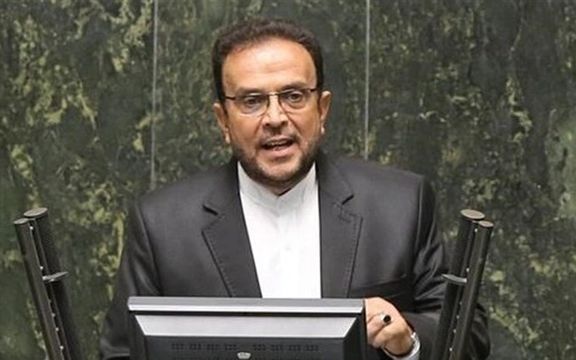
A hardline Iranian lawmaker has said Tehran will punish Israel over its recent attack on air defense systems in Isfahan as the tit-for-tat conflict continues to escalate.
“The Islamic Republic of Iran will not leave unanswered any action against its national interests … Iran’s response can come in many shapes and forms but we will do it tactfully,” said Mahmoud Abbaszadeh Meshkini, who serves as a member of the National Security and Foreign Policy Commission of the Iranian parliament.
Reiterating the positions of senior Iranian officials, Abbaszadeh tried to downplay the Isfahan offensive, calling it “a show” performed by Israel in an attempt to “restore its dignity” following Iran’s missile and drone attacks last weekend. For the Israeli government, the media coverage of the incident was more important than its location and intensity, remarked the lawmaker.
On April 13, Iran launched its first ever direct offensive against Israeli territory with more than 350 drones and cruise and ballistic missiles, 99 percent of which were downed, according to the Israeli army.
Early Friday, Israel reportedly targeted Esfahan's 8th Shekari Air Base in retaliation for Iran’s offensive. Though satellite images and reports indicate that a major defense system in the airbase was damaged, Iranian officials and state media have unanimously played down the operation.

The regime has recently intensified its crackdown against critics, summoning those who have publicly expressed their disapproval of Tehran’s policy with regard to Israel. Earlier in the week, the government took legal action against a number of newspapers and influential journalists who failed to reiterate its rhetoric regarding the attack on Israel in their publications.
Prominent reformist commentator Abbas Abdi, investigative journalist Hossein Dehbashi, and whistle-blower Yashar Soltani were accused of “compromising national security” following their comments regarding Iran’s attack on Israel’s soil.
Ali Salehabadi, the managing editor of Setareh Sobh daily, criticized the government’s foreign policy with regard to Israel in shrouded remarks interwoven within the fabric of an article released on Saturday, asking what had made the West turn support Israel so soon after all but turning its back on the Jewish state.
He also asked why the Arab masses and Arab states abandoned the ideas of 'throwing Jews in the sea and destroying Israel', and turned to compromise with Israel, Salehabadi wrote. He noted that some Arab countries such as Jordan collaborated with Israel, the US, the UK, and France to intercept and down Iranian projectiles before reaching the Jewish state.
He juxtaposed Iran’s declining economy and the rising regional tensions, warning that a war with Israel would target Iran’s economy and inflict damage to the people.
In more than a decade, the country's economic growth has averaged zero. The situation has been further exacerbated since the US withdrawal from the JCPOA nuclear deal in 2018. Over the past six years, the rial, Iran’s national currency, has fallen 15-fold, fueling inflation and plunging millions of citizens into poverty. Eqtesad 24 news website reported in February that almost one in every three Iranians is currently living below the poverty line as a result of soaring inflation in the past five years.
Meanwhile, Saber Golanbari, journalist and political analyst, wrote in his Telegram channel that neither Israel nor Iran seeks a direct confrontation due to the enormous costs of a war.
“The future is likely to usher in a new round of indirect warfare in various forms. Israel will most probably try to focus more than ever on sabotage against sensitive Iranian facilities as well as on indirect assassinations,” he pointed out.
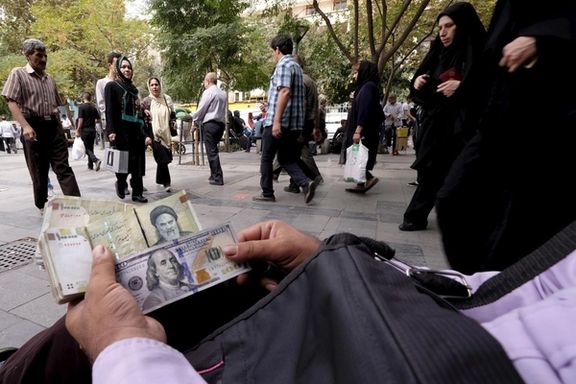
Amid massive public disapproval of last week's air attack on Israel, the Islamic Revolutionary Guard Corps (IRGC) has expressed gratitude towards the Iranian people for what it called their 'support'.
Despite the claims, there was no specific mention of the nature of the support from the public, who reportedly spent the past week in anxiety over potential Israeli retaliation in addition to the streets of Iran being strewn with graffiti with supportive messages for Israel.
The IRGC's statement proclaimed, "We humbly appreciate and are grateful for your magnificent support and backing…for the IRGC in punishing the Zionist enemy during these historic everlasting days."
The latest IRGC statement described the operation as having brought "peace and assurance" to Iran and "fear, terror, and humiliation to the Zionist regime and its allies" as the regime continues to play down the fact that in partnership with a US-led coalition, almost all the barrage was intercepted before reaching Israeli territory.
The IRGC's victorious narrative has been accompanied by a tightened clampdown on dissent within Iran. Following the assault on Israel, which was purportedly in retaliation for an attack linked to Israel on Iran’s consulate in Syria, there has been an increase in repressive actions against journalists and media outlets critical of the regime.
The Tasnim News Agency, affiliated with the IRGC, even issued a warning last week on Twitter (now X) about dealing with Israel's supporters on social media, urging citizens to report pro-Israel sentiments.
The directive has led to an atmosphere where journalists are either treading cautiously or completely avoiding discussions on the attack. The Prosecutor's Office has also taken legal action against some media outlets; for instance, the daily newspaper Etemad was indicted for publishing content opposing the attack, and Jahan-e Sanat faced charges over an article about the economic impact of escalating tensions, specifically rising exchange rates.
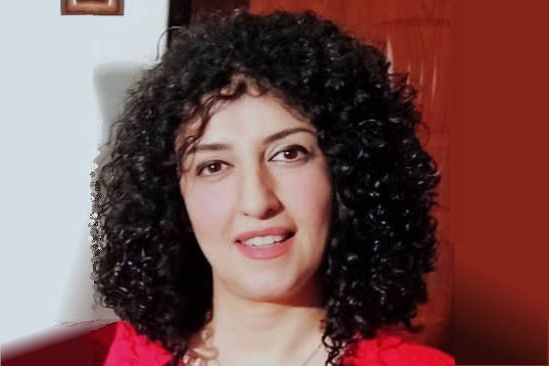
Narges Mohammadi, the Iranian Nobel Peace Prize laureate, in a message from prison sent to Iran International says the struggle of Iranian women against forced hijab is “resistance against the government's oppression.”
Mohammadi made the statement as she observed her 53rd birthday in prison, marking the tenth time she has spent her birthday behind bars.
“The struggle of Iranian women against compulsory hijab is not merely a fight for the right to choose one’s dress; and the government’s oppression of women is also not just an issue of its religious ideology. Both Iranian women and the Islamic Republic regime recognize that this issue represents the defeat of religious tyranny,” she said.
Mohammadi has been imprisoned multiple times for her human rights activities and currently is serving a 6.5-year sentence. She was last arrested in 2022 during nationwide anti-government protests triggered by the death of 22-year-old Mahsa Amini in police custody. She was arrested in September 2022 for “improper hijab” and died three days later from severe head injuries.
Mohammadi said in her statement that “Compulsory hijab is a symbol of submission to illegitimate government authority, serving as a tool for the regime to maintain its power and control. The broad scope of this opposition has not only halted at the boundaries of women's rights but has also challenged the power apparatus itself.”
The government launched a new campaign in the streets to force women to wear hijab on April 14. Thousands of police officers and plainclothes agent patrol the cities to arrest women who appear in public without hijab. This has led to confrontations and violent arrests of mostly young women.
“The resurgence of morality patrols, the presence of law enforcement in uniforms, and the intensification of violence in public spaces are all government attempts to instill fear. However, the resistance and increased confrontations demonstrate the strength and power of the protesters,” Mohammadi noted.
Some observers believe that the crackdown was timed to coincide with heightened tensions between Iran and Israel, both as an opportunity to crack down while the world is focused on the possibility of large-scale conflict, and also to intimidate the population not to engage in protests.
Mohammadi, who has increasingly become a more vocal critics of the Islamic Republic, concluded her statement with praise for those who defy compulsory hijab: “Civil disobedience and defiance of compulsory hijab, especially by the younger generation of Iranian women, have brought them into the forefront. Despite the heavy toll they have borne, their courageous struggle against the government has left a significant mark. This fight, due to the inability of oppressive forces to sustain long-term presence on the streets and conversely, the potential for continued civil resistance by women, will ultimately benefit the people.”
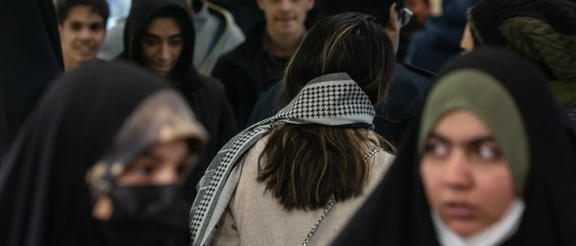
Conservative officials and media outlets have scrambled to play down this week's crackdown on women as hijab enforcement police have flooded the streets of Tehran and other cities.
On Saturday, Javan newspaper cited the head of the Iranian judiciary, Gholamhossein Mohseni Ejei, who had called for more vigorous enforcement of hijab laws in early April, as saying in a conference on Friday, "We do not wish to punish anyone who violates the rules on the street," denying the widespread abuse, both physical and verbal which women have reported since last week.
In a seeming bid to calm the tensions on Friday, he said, “We are not free from mistakes, and any possible wrong behavior of the officers will be dealt with.”
On Saturday, Mohammad Safari Malekian, a member of Iran’s parliament, was quoted on state news as saying: “Unfortunately, the country has suffered enormous costs due to the ill-considered enforcement of hijab. Distasteful behavior and an excessive amount of pressure on the issue of hijab will not achieve any results.”
Despite the rise in police violence, the controversial hijab bill officially titled "Protection of Family Through Promotion of Hijab and Chastity Culture" has not yet been passed into law. Despite receiving parliamentary approval in September 2023, the draft was rejected for review by the Guardian Council, which is the ultimate legislative authority.
Last Saturday, police announced the Nour (Light) Plan, a new initiative to enforce hijab wear, following what they claimed to be a "national and public demand."
Ever since then, videos have flooded social media demonstrating the widespread presence of the morality police and their violent crackdown on hijab rebels, driving a massive backlash from women’s rights activists, political commentators, and journalists.
A significant number of morality police forces disappeared from the streets after the backlash sparked by the death in morality police custody of Mahsa Amini, 22, causing widespread protests across the country in 2022.
Reformist media have also continued to voice their concerns. Mohammad-Hadi Jafarpour, who practices law in Shiraz, told Etemad that conservatives should define hijab as a duty rather than law. “In a political regime where laws and rules are defined based on Sharia, it is necessary also to define duties based on Sharia. According to the Quran, as the most substantial document of Islamic law, freedom is the most basic human right,” he said.
While the recent crackdown happened after Supreme Leader Ali Khamenei repeatedly stated that ignoring the hijab is a red line that should not be crossed, an official close to Khamenei quoted him on Friday with an apparent restrained approach.
A deputy chief of the Office for the Preservation and Publication of the Works of the Leader of the Revolution, Mehdi Fazaeli, stated that the leader had cautioned some officials to refrain from taking any "irregular and spontaneous" actions regarding the hijab.